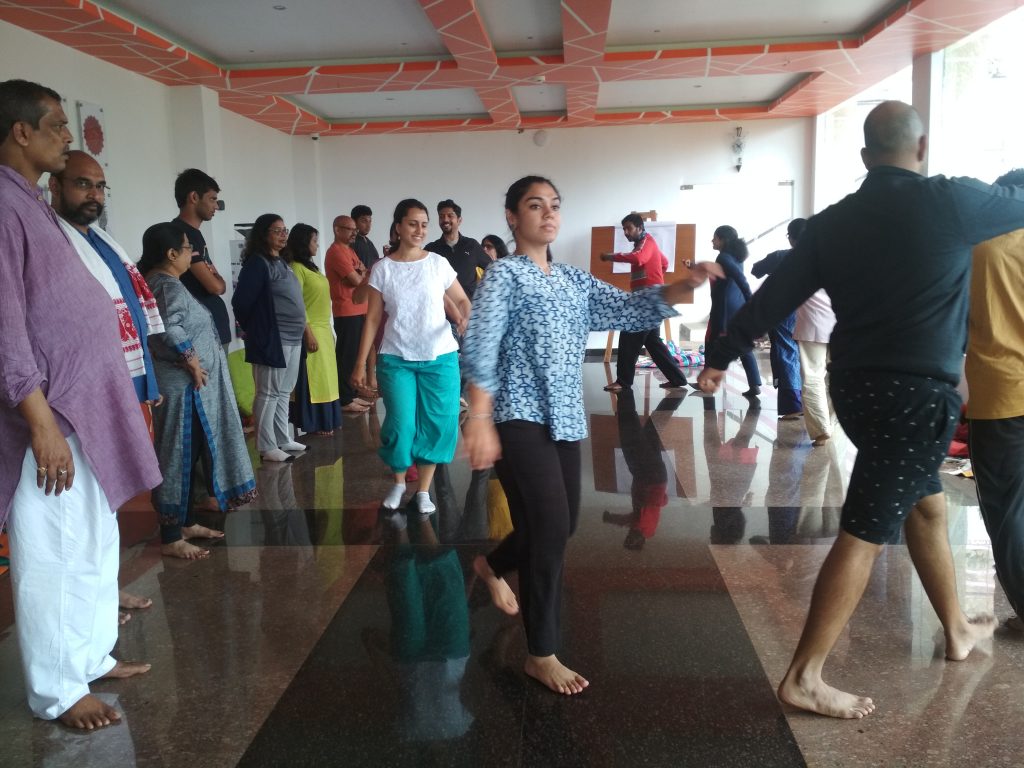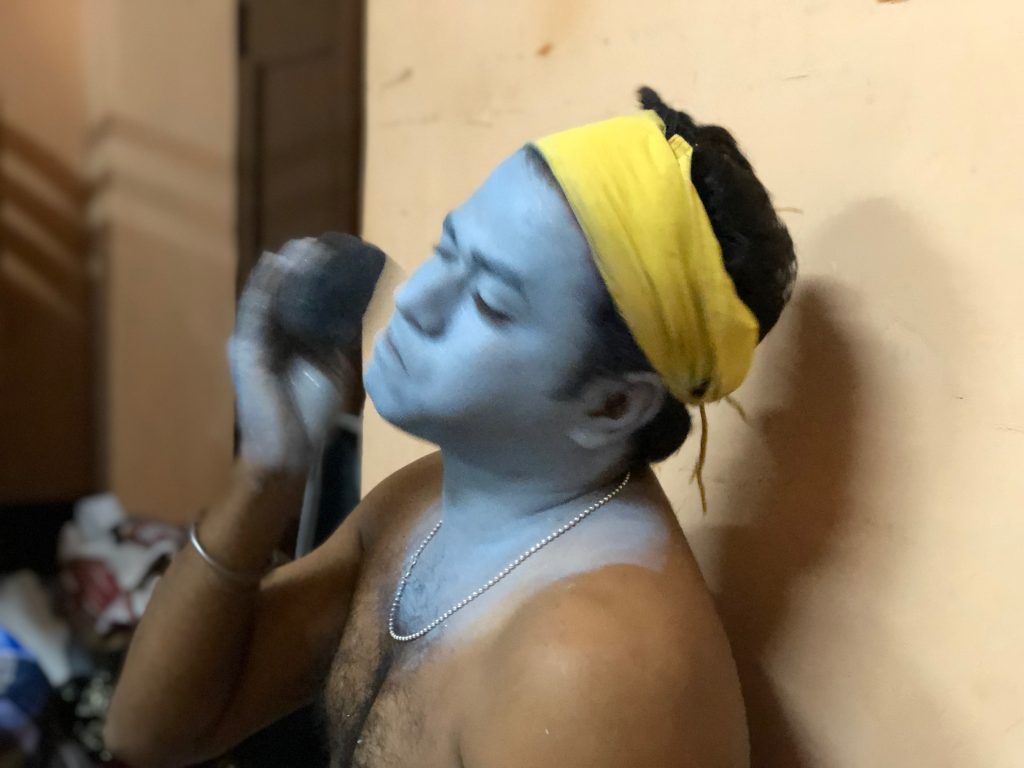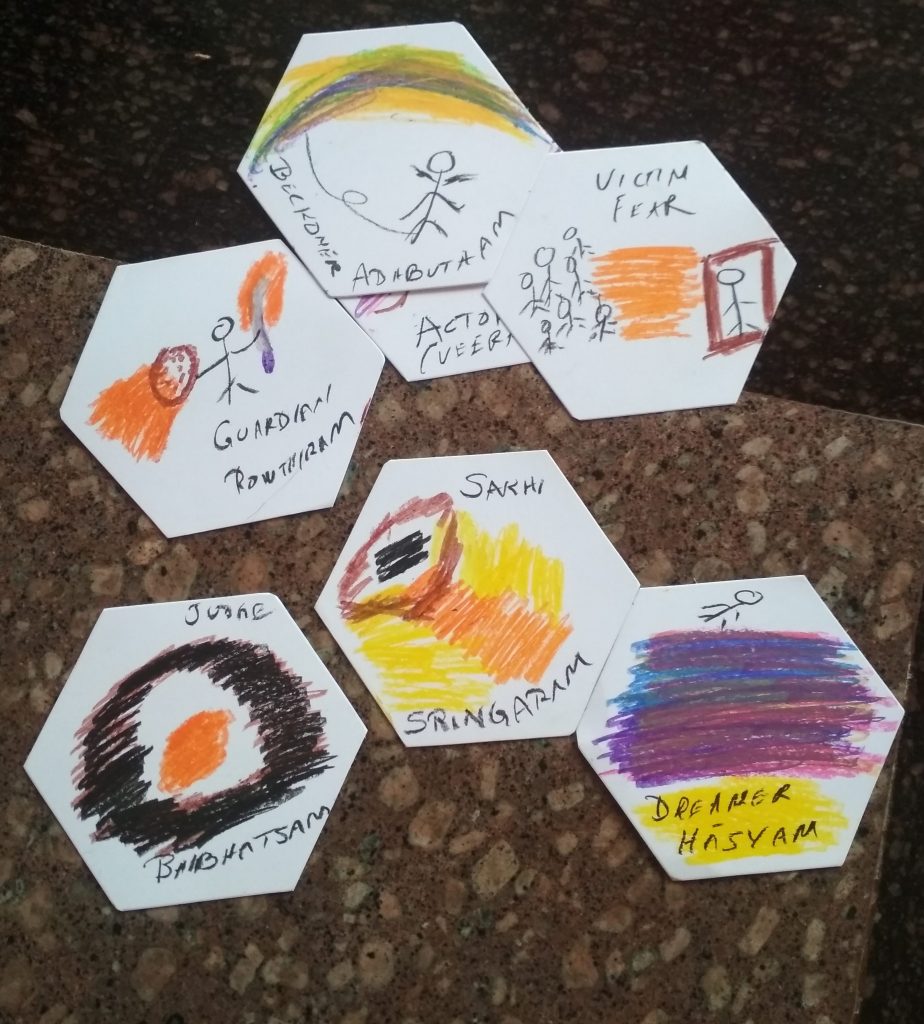Rajeev and Anita, two of the co-facilitators of MI7 (August 4-10, 2019) share their reflections as a dialogue. Read on for your mini immersion.

Anita: Hi Rajeev, It has been over a week since I came back from MI7 and there is a certain sense of ease, beauty, stillness, a quiet conviction, and a comforting feeling within – having reconnected with the sakhi and the sakshi a little more. Coming back to MI after about 3 years (MI1@ dakshin chitra) has been wonderful and i could see shifts that have happened since and the way the program has also evolved. What emerged as a practice for me is to hold the demands of a role and my being simultaneously. I think I have begun to take some steps in that direction.
Rajeev: Yes, It’s been almost 2 weeks since MI7 ended. Much had happened in the ‘world outside’ that week that on my coming back home, I had to hit the ground running 🙂 At the same time, I’m in touch with the last day checkout and a few things I was in touch with that afternoon: experiencing a certain sense of playfulness and focus, and in touch with a sense of expanse and also in touch with the beauty and pain of human existence that so beautifully came to life in the plays. In many ways, this MI (like many other labs) was like a pilgrimage for me. And some of my prep towards the MI reminded me of my trips to Sabarimala in my younger days – of course, with a different set of practices.

Anita: I found that the group that came for this MI was quite diverse in terms of the work they do and their interests. And how relevant each of them felt the program was for them. I think we are moving in the direction of reaching out those we would like to serve: namely individuals engaged in empowering others, those looking for deeper anchorage, those keen to learn indic approaches, those interested in non-guru centered experiential learning, those are burnt out and looking for regeneration. Debjeet, one of the participants, who is an activist shared how this process is a must for those who are activists for precisely these reasons (anchorage, regeneration, experiential learning and indic approach). The process is very unique and I am convinced that we need to claim this unique-ness without any tentativeness as we go out into the marketplace with this and other offerings.
Rajeev: Yes, I was amazed at the diversity of people at this MI. Many times, when I’ve talked to people about our work, a typical response is that “oh but this would be of interest only to people from specific backgrounds” and every time we see a diverse group in our programs, I feel energized. We had activists, home makers, entrepreneurs, corporate employees, back to the landers – the work seems to draw people who may come from different backgrounds, and are clearly at a certain threshold and want to dive within. There was a definite intensity to this group as well which we felt right from Day 0 when people shared “who am I, where am I, why am I here”

Anita: I also found the koothu group to be excellent – both in terms of the content and the quality of their performance. Karna moksham was the theme and the details that they presented, and the koothu was riveting. Almost everyone watched till the end despite the drizzling rain that continued on and off during the show. Ravi was saying that usually it will rain when karna moksham is performed, even in places where there is no rain and it was fascinating that what was as drizzle become heavier as we inched closer to the end to the scene of karna dying.
Rajeev: True, The koothu group was brilliant. It was incredible to see how they explored the archetype of Karna so comprehensively with the kind of stories they had picked. I had the fortune of watching them don the costumes and make-up. Amidst the chit chat and the banter, as the layers came on, the intensity of the room changed. And the koothu began, amidst a slight drizzle – the artists wanted umbrellas more to protect the instruments than themselves! And even as the drizzle turned heavier and it got colder – it was almost they were unmindful of it all – the play only intensified. The refrain on how he was so ‘stuck’ to the debt he felt he owed to Duryodhana for giving him legitimacy (‘senjotru kadan’) particularly struck a chord in me – how I had mortgaged a large chunk of my life to those who affirm “I am” and how I had not really grieved for that enough. And also ask, how much do I still do it? Karna’s difficulty with the feminine and the anguish of Karna over the seven tragedies in his life time that had brought him to that point just built it all up to the final scene! Almost all participants just stayed on in their seats under umbrellas – helping with translations – just making the space more intimate and connected!
Anita: And that brings us to the main exploration of MI, which starts after the koothu play – that of the participants coming together in groups of 4-5 to explore an archetype through a scene of their choice. And of course Karna was one of the archetypes chosen for exploration. Other archetypes for exploration were Arjuna, Gandhari, Karna, Yudhisthira and Draupadi.
 Rajeev: Yes, and the exploration that started in the koothu continued in the Karna play; the difficulty with defining I am, I can and I will for one self. I got in touch with a whole set of my patterns where as a response to my struggle with “I am”, I often times have defined myself “I can” therefore “I am” and pursued various ways to use my skills in service of the space holders and feel affirmed. Even as I discover assertion, I realized that I hadn’t grieved enough for all the times I have done this and I am grateful to have received the space there for this. To me it was also a reflection of where we are as a civilization, especially as a nation. Our history of being colonized and colonization that happens today further weakens our ability as a people to grieve, assert and stake claim to the wealth we genuinely hold.
Rajeev: Yes, and the exploration that started in the koothu continued in the Karna play; the difficulty with defining I am, I can and I will for one self. I got in touch with a whole set of my patterns where as a response to my struggle with “I am”, I often times have defined myself “I can” therefore “I am” and pursued various ways to use my skills in service of the space holders and feel affirmed. Even as I discover assertion, I realized that I hadn’t grieved enough for all the times I have done this and I am grateful to have received the space there for this. To me it was also a reflection of where we are as a civilization, especially as a nation. Our history of being colonized and colonization that happens today further weakens our ability as a people to grieve, assert and stake claim to the wealth we genuinely hold.
Anita: I found that although Karna is an all-time favorite archetype yet so difficult to explore. This difficulty was obvious in the play that the group put up, as lack of any voice except the voice of put downs and contempt from the system (suta putra). I was almost choking by the end of the play. Karna is an absolute shadow of the arjuna archetype. Arjuna hears a very encouraging and legitimizing voice of the system. Karna on the other hand never hears a legitimizing voice from the system for “I am”. Arjuna never has any doubt about who he is (“I am …”). Most of his questions are centered around what can I do, what will I do etc. However for Karna, “I am …” does not have simple clear answers. Our love for and association with Karna is a reflection of the struggle within each of us – when we know we are capable of something larger, of our heroic potential, but the world does accept that and constantly punctures it by pointing to us that “I can”, “I will” is not enough, “I am” is a necessary requirement. In an attempt to compensate for “I am”, one invests excessively in the “I can” and “I will” identities, burning oneself out, never receiving closure with the statement of “I am” until perhaps it is too later or never. Entrenched in the victimhood that comes out of not knowing who I am, one finds solace in doing (i can, and i will), being the giver, so the world accepts me for what they get. But that creates it own counter-dependency, where one gets caught in that. Is it possible for each one of us to say I am worthy of myself without any external references? What would it take for us to drop our efforts to prove “I am”?
 I was also very fascinated by the Arjuna play that explored a dialogue between Arjuna, Ekalavya and Karna taking us all into an hitherto unexplored context. One could see how these three characters are so similar with respect to their personal prowess (ace archers) and how legitimacy, privilege, social structures created the distinctions and distinctiveness. In essence they are all one archteype split into 3 due to the difference accorded by legitimacy, privilege and social structures. One could also see how much of power we give to external structures and legitimization and the price we pay for it, without owning up to how we have given permission for these to be a part of our life. Arjuna’s struggle with the questions such as “how do I own up to be an agent of dharma when I know I have been an agent of adharma in the past, how do I resolve this?”, “Do I give up my privilege or do I turn it into a resource?” resonated with many in the group who are working with the poor and those who are at the margins of our society. How does it serve me to be a part of the poor? How do I hold privilege – with loathing? guilt? shame?. This is also the story of many of us as Indians, Brahmins etc. How am I holding my Indian-ness, my belonging and privileges? It became clear that any new action cannot emerge from these location of personal hurts, which only take us deeper and more entrenched in the victim, guardian, judge or beckoner locations. For rewriting the narrative one needs to look at this entrenchment that comes from the the guilt, the shame of having the privilege or the entrenchment that comes with feeling like a victim of not having privilege or legitimacy. This looking is from the sakhi and sakshi location, from where healing can happen and new possibilities can arise.
I was also very fascinated by the Arjuna play that explored a dialogue between Arjuna, Ekalavya and Karna taking us all into an hitherto unexplored context. One could see how these three characters are so similar with respect to their personal prowess (ace archers) and how legitimacy, privilege, social structures created the distinctions and distinctiveness. In essence they are all one archteype split into 3 due to the difference accorded by legitimacy, privilege and social structures. One could also see how much of power we give to external structures and legitimization and the price we pay for it, without owning up to how we have given permission for these to be a part of our life. Arjuna’s struggle with the questions such as “how do I own up to be an agent of dharma when I know I have been an agent of adharma in the past, how do I resolve this?”, “Do I give up my privilege or do I turn it into a resource?” resonated with many in the group who are working with the poor and those who are at the margins of our society. How does it serve me to be a part of the poor? How do I hold privilege – with loathing? guilt? shame?. This is also the story of many of us as Indians, Brahmins etc. How am I holding my Indian-ness, my belonging and privileges? It became clear that any new action cannot emerge from these location of personal hurts, which only take us deeper and more entrenched in the victim, guardian, judge or beckoner locations. For rewriting the narrative one needs to look at this entrenchment that comes from the the guilt, the shame of having the privilege or the entrenchment that comes with feeling like a victim of not having privilege or legitimacy. This looking is from the sakhi and sakshi location, from where healing can happen and new possibilities can arise.
Rajeev: The question that came up for me was: As the blue-eyed boy, how much of what Arjuna has accomplished was due to this position of privilege and how much was his own effort!? This resonated with most of the group and I got in touch with my journey with my position of privilege (male, Brahmin, social, financial, educational background) and all my reactions to it in different ways. It took me back to some time in 2002 when I was one of the first to put up my hand in response to say “How I’m responsible in direct and indirect ways for all the injustice in the world”. It was sort of a flashback of looking at the all the collusive and rebellious choices I had made from this location and not quite found my own ‘definition’ for this. It is when I discovered the process of really finding what I’m responsible for, how I can be responsive and how I can operate from spaces other than guilt, where I have abused this power, find ways to mourn, use this power to possibly find ways to co-create equitable spaces, did a shift start. This is again an important ongoing part of my journey.
 Anita: Yes, that resonates with me as well, all the rebellious choices that I made to shun the privileges I had. And the journey now to embrace the privilege and find a new ground for living. In relation to this idea of privileges and resources, I was also struck by the Gandhari play where the scene of Gandhari and Dhritarastra getting to know of Duryodhana’s death and Gandhari cursing krishna for this outcome was explored. What makes one give up the possibility of using the resources that one has and literally turn a blind eye instead to one self and the world? And in the process of doing so what are the consequences and the repercussions of oneself and the context? A completely new narrative could have emerged at every step had Gandhari made different choices. What came to fore were some of these questions and explorations: what am I choosing to be blind to? What would happen if I open my eyes and encounter the world? And in the process of choosing to be blind to something, i am cheating and deceiving myself, finding entitlement in my victimization, nursing vengefulness and anger and turn it either inward onto myself or outward. How am I using any stigma/helplessness that I fee to my advantage and giving it as a excuse to avoid taking responsibility for one’s action? Often those who are stigmatized in the social structure play this game for their survival and advantage. Again I was left with the power of the entrenchment in the locations of victim, guardian, judge, so much so that one holds on to it at any cost!
Anita: Yes, that resonates with me as well, all the rebellious choices that I made to shun the privileges I had. And the journey now to embrace the privilege and find a new ground for living. In relation to this idea of privileges and resources, I was also struck by the Gandhari play where the scene of Gandhari and Dhritarastra getting to know of Duryodhana’s death and Gandhari cursing krishna for this outcome was explored. What makes one give up the possibility of using the resources that one has and literally turn a blind eye instead to one self and the world? And in the process of doing so what are the consequences and the repercussions of oneself and the context? A completely new narrative could have emerged at every step had Gandhari made different choices. What came to fore were some of these questions and explorations: what am I choosing to be blind to? What would happen if I open my eyes and encounter the world? And in the process of choosing to be blind to something, i am cheating and deceiving myself, finding entitlement in my victimization, nursing vengefulness and anger and turn it either inward onto myself or outward. How am I using any stigma/helplessness that I fee to my advantage and giving it as a excuse to avoid taking responsibility for one’s action? Often those who are stigmatized in the social structure play this game for their survival and advantage. Again I was left with the power of the entrenchment in the locations of victim, guardian, judge, so much so that one holds on to it at any cost!
Yudhisthira was the next character explored and the scene explored was that of the moment after the dice game when yudhishtira has lost everything and draupadi is having a conversation with Bheeshma and yudhishtira. The play explored yudhisthira appealing to Bheeshma to intervene and stop what was to unfold with draupadi being dragged into the sabha. The decay, defunct-ness, opreesion and the dead-ness of this system was palpable, that this system and the head of the system can longer ensure the everyone can live in peace and with honor was visible and loud. What was also evident was the ways in which we lean on the system, the authority, the role etc. to avoid owning up to our own impotence, inability to act, and the ways in which we have betrayed ourselves and others repeatedly. We become proxy-holders, proxy-actors, fragmented from the reality and hold our allegiance to the system rather than reality and our conscience. This happens when structures/decisions that we have created (that are meaningful at a certain point in time) become irrelevant, rigid, without intuition, softness and we refuse to change and instead pawn our power to act and pledge our allegiance to this system/structure/authority, and collude with the system! The yudhistira and the bheeshma in us need to ask “what level of accusation and confrontation am I willing to take if I take a radical step?” But this is a long and painful process as the old in us will die only when we are ready to let it die (perhaps a painful death like that of Bheeshma on the bed of arrows!).
 Rajeev: The Draupadi enactment was so befitting to bring this phase of MI to a close. The scene was set in the private quarters of Draupadi, that Dussasana enters to take her to the main hall where the dice game was played. The group got in touch with the entire process of violation of the feminine – the injustice, the rage and most impactful was the silence from the space holders and it was a heart-rending moment when the protagonist looked at each one of us in the eye and asked “is there anyone in the sabha who is willing to stand up”? I got in touch with all the violations we dish out on the Ultimate Mother – the Mother Earth. And how many times I’ve had this notion that we are saving the Earth whereas all we can do is at best, save ourselves from our selves and each other. It’s only a matter of time before She, with infinite patience and infinite rage, says “enough is enough” and swallow us all like She has done many times before! And the magic that happens when I surrender all that I know and allow for the inner Krishna to emerge.
Rajeev: The Draupadi enactment was so befitting to bring this phase of MI to a close. The scene was set in the private quarters of Draupadi, that Dussasana enters to take her to the main hall where the dice game was played. The group got in touch with the entire process of violation of the feminine – the injustice, the rage and most impactful was the silence from the space holders and it was a heart-rending moment when the protagonist looked at each one of us in the eye and asked “is there anyone in the sabha who is willing to stand up”? I got in touch with all the violations we dish out on the Ultimate Mother – the Mother Earth. And how many times I’ve had this notion that we are saving the Earth whereas all we can do is at best, save ourselves from our selves and each other. It’s only a matter of time before She, with infinite patience and infinite rage, says “enough is enough” and swallow us all like She has done many times before! And the magic that happens when I surrender all that I know and allow for the inner Krishna to emerge.
Anita: Yes, Draupadi is also an all-time favorite, isn’t it. I was waiting for this play and as the play progressed, the assault on the most private and safe spaces of ourselves was shocking and felt like a scene of infinite horror and shame. The silence that followed after the play and the reflections by the actors was deafening. Where does one go when the most private and what one considers the safe space is transgressed? The pain, hurt and shame of every victim ever could be heard and experienced. The pain, hurt, and resilience of mother earth was palpable. The unwillingness to see this horrid scene and accept the ways in which the system has let the vulnerable down also could be seen. This is the story of every aspect of human life – from families, social structures, global warming and climate change, displacement due to mining/other human activities, the recent turmoil in Kashmir and on and on it goes. And while the rage simmers, one waits in the private quarters wondering whether to encounter the world or collude or withdraw? What are the options, really? And who does one turn to? Do I have it in me to leave my hold on every possible refuge, escape, belief, entrenchment, and allow the Krishna within to emerge? And see that the ugliness that one carries belongs to the system and demand that the system be held responsible for it?
Rajeev: In this time of humanistic and ecological crises, I’m even more convinced that, one of the only ways ‘out’ is through the praxis offered by the Indic wisdom and the purana. The plays, in fact, were reflective of all the questions that are imperative for us to ask in these times:
- How many times in my blind love and selfishness, have I not ‘stopped the war’, done what’s really in my power to stop adharma when I see it?
- How do I use my position of power and privilege? Is to further strengthen it for my own ‘extractive purposes’ only or am I able to use it in a way that can help energize the context?
- Have I simply stuck and remain stuck to a promise that I made many years ago – not quite re-looking at it as and when the context changes. Do I have the courage to stand-up and re-negotiate and state my needs as well?
- And when I goof-up, and it comes to my attention, do I really own up and work from there? Or do I withdraw or ignore and not learn how to learn from my context and others?
- Am I truly listening to the voices of the parts of me and of the society that I’ve (we have) disowned? When confronted by these, what do I really do?
- Can I find a practice that really helps me assess my skills and my ‘worth’ – not depend on external affirmations?
 Anita: As we moved to the last day after these plays, we were all left with the most astounding feeling of how the mahabharata was like a magic carpet that we stepped onto and journeyed into the deepest parts of ourselves through it, rediscovering, re-claiming parts of ourselves. The possibilities that these stories and characters offer are immense and it is no wonder that there are so many versions, twists, turns, sub-stories and so on, all without compromising the essence of the main story line. The relevance of these stories and characters when explored from a sakhi and sakshi bhava really begins to show us new possibilities for ourselves. And that is the uniqueness of this immersion program. The pre-work that we do before and during the program prepares one for this kind of an exploration.
Anita: As we moved to the last day after these plays, we were all left with the most astounding feeling of how the mahabharata was like a magic carpet that we stepped onto and journeyed into the deepest parts of ourselves through it, rediscovering, re-claiming parts of ourselves. The possibilities that these stories and characters offer are immense and it is no wonder that there are so many versions, twists, turns, sub-stories and so on, all without compromising the essence of the main story line. The relevance of these stories and characters when explored from a sakhi and sakshi bhava really begins to show us new possibilities for ourselves. And that is the uniqueness of this immersion program. The pre-work that we do before and during the program prepares one for this kind of an exploration.
Rajeev: The last couple days at MI and a few days after, I was humming this song called “Jhini Jhini Bini Chadariya” by Kabir without even knowing the full song. I came home and looked it up and the translation is:
You have woven a very fine and delicate tapestry, free of impurities of any kind!
What refined and subtle yarn, what complex interlacing You have used to weave it!
Using the 3 naadis as threads, Twenty four hours on end, Your spinning wheel turns,
Weaving the tapestry from all five essential elements.
Ten months does it take You to weave his tapestry,
With the greatest of craftsmanship and care
That exquisite tapestry is worn by the celestials, by Saints, and by human beings alike.
But, alas, they have all invariably defiled it !
Your humble devotee Kabir has worn it scrupulously and meticulously,
And is returning it to You, O’Lord, unblemished and pure!
Perhaps in those 7 days, we got an opportunity to wear it like Kabir, even if for a brief moment.


 Priya is a Yoga therapist in the Krishnamacharya tradition. She adapts Reiki & energy work, Vedic chanting, life coaching & Ayurvedic practices in her healing spaces. She is committed to nurturing collectives that have the praxis of Yoga at their heart.
Priya is a Yoga therapist in the Krishnamacharya tradition. She adapts Reiki & energy work, Vedic chanting, life coaching & Ayurvedic practices in her healing spaces. She is committed to nurturing collectives that have the praxis of Yoga at their heart. Anisha has been on an exploration to understand herself through yoga for the last 15years which led her to teaching yoga, yoga therapy and inner work through yoga.
Anisha has been on an exploration to understand herself through yoga for the last 15years which led her to teaching yoga, yoga therapy and inner work through yoga. Apoorva chanced upon Yoga in her early 20s. A spark was lit within and there was no turning back. Her exploration led her to the Krishnamacharya tradition more than a decade ago. Curious about human behaviour and what drives it, she was thrilled when her search ended (and also began) when she first came upon the Yoga Sutra, which illuminated a path towards answering many questions that had been held for a long time.
Apoorva chanced upon Yoga in her early 20s. A spark was lit within and there was no turning back. Her exploration led her to the Krishnamacharya tradition more than a decade ago. Curious about human behaviour and what drives it, she was thrilled when her search ended (and also began) when she first came upon the Yoga Sutra, which illuminated a path towards answering many questions that had been held for a long time. Anita is a yoga teacher and therapist in the tradition of Sri.T.Krishnamacarya and Sri T.K.V. Desikachar, a Reiki practitioner and a Life Coach. She is also the founder of Vishoka, a center for learning Indic and energy-based frameworks for living and healing. Her deep concern for human suffering and the problems of unsustainable living kept her on the path of seeking an integrated approach to looking at life, living, learning and healing.
Anita is a yoga teacher and therapist in the tradition of Sri.T.Krishnamacarya and Sri T.K.V. Desikachar, a Reiki practitioner and a Life Coach. She is also the founder of Vishoka, a center for learning Indic and energy-based frameworks for living and healing. Her deep concern for human suffering and the problems of unsustainable living kept her on the path of seeking an integrated approach to looking at life, living, learning and healing. Ankit is a seeker in the wisdom traditions of India. The core of his work includes creating dialogic spaces where people can look within and see the connection between their inner and outer lives. Inspired by the likes of Gandhi, Aurobindo, Vivekananda and Guru Gobind his experiments in service took him back to his roots in Punjab where he is creating a community-led model of higher education which is open, inclusive and accessible for all. Ritambhara for him is a space for engaging in a community which is committed to a DHramic life. He anchors his work of learning and leadership in the Antaranga Yoga Sadhana and the humanistic wisdom of Mahabharata.
Ankit is a seeker in the wisdom traditions of India. The core of his work includes creating dialogic spaces where people can look within and see the connection between their inner and outer lives. Inspired by the likes of Gandhi, Aurobindo, Vivekananda and Guru Gobind his experiments in service took him back to his roots in Punjab where he is creating a community-led model of higher education which is open, inclusive and accessible for all. Ritambhara for him is a space for engaging in a community which is committed to a DHramic life. He anchors his work of learning and leadership in the Antaranga Yoga Sadhana and the humanistic wisdom of Mahabharata.